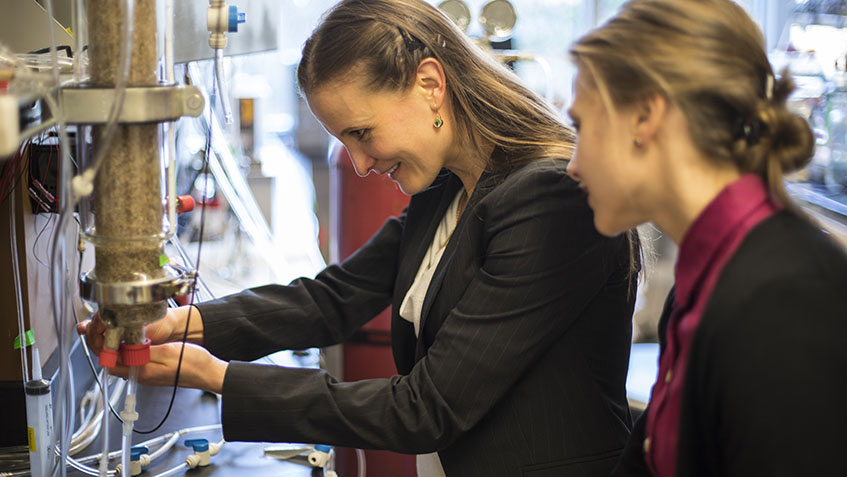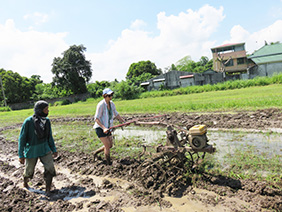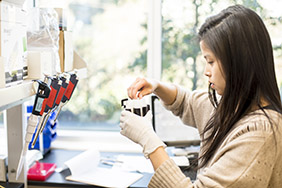 Assistant Professor Mari Winkler's wastewater treatment research.
Assistant Professor Mari Winkler's wastewater treatment research.
Overview
Environmental Engineering (EE) research investigates the effects of natural and human activities on the environment, with the goal of both protecting human populations and safeguarding the environment. EE researchers also develop increasingly efficient and selective methods to remove contaminants from air, water, contaminated soils and sediments, and decrease the amount and adverse effects of wastes. EE researchers work on solutions to better utilize water, air and soil resources to maintain a sustainable environment. EE faculty and students focus their research on the following broadly defined areas:
- Air resources engineering: Air pollution currently causes more than 3 percent of all deaths in the United States, according to UW’s Institute for Health Metrics and Evaluation, which is a higher percentage than deaths related to drug use or road injuries. To address this challenge, researchers assess the origins of pollutants, work to remove air pollutants and measure and model downwind air quality.
- Environmental & water quality engineering: Researchers work to identify trace concentrations of chemical and biological contaminants in water, air, soil, or solid waste; explore the sources, movement, and transport of contaminants in natural systems; and develop engineered processes to minimize the impacts of contaminants on humans and sensitive environments.
- Environmental systems: Researchers investigate the effects of pollutants in waters by examining the chemistry and biology of lakes, streams and estuaries. They explore the processes involved in eutrophication, which is how the environment responds to artificial or natural substances, primarily phosphates found in fertilizers, detergents and sewage.
Research topics
- Air resources
Faculty involved: Timothy Larson, Julian Marshall - Biogeochemistry
Faculty involved: David Butman, Rebecca Neumann - Drinking water treatment
Faculty involved: Mark Benjamin, Michael Dodd, Gregory Korshin - Environmental chemistry
Faculty involved: Joel Baker, Mark Benjamin, Michael Dodd, Edward Kolodziej, Gregory Korshin, Rebecca Neumann, Jessica Ray - Environmental microbiology
Faculty involved: David Stahl, Erica Fuhrmeister - Environmental systems
Faculty involved: Joel Baker, Michael Brett, David Butman, Rebecca Neumann - Phytoremediation with transgenic plants
- Resource recovery
Faculty involved: Jessica Ray, Mari Winkler - Site remediation
Faculty involved: Joel Baker, Edward Kolodziej, Jessica Ray - Wastewater treatment
Faculty involved: Jessica Ray, Mari Winkler, Erica Fuhrmeister
Student research
Researcher: Yasmine Farhat, Ph.D. student

Rice is the primary staple food for more than half of the world’s population. The impact of climate change on the nutritional quality of rice, therefore, may have devastating consequences, especially in the developing world. As part of her research on this topic, Ph.D. student Yasmine Farhat participated in a training course in the Philippines, where she learned about rice agriculture.
Researcher: Stephany Wei, Ph.D. student

All living organisms require phosphorus, a critical component in our DNA that enables cell growth. As a limited and nonrenewable source, phosphorus recovery is becoming increasingly important. To address this challenge, Ph.D. student Stephany Wei is researching a biological wastewater treatment process that increases the potential to recover phosphorus from waste.
International engagement »
Environmental engineering research has global reach, with many faculty and students participating in research and teaching in countries throughout the world.
Start-ups
Ideas that originate in the lab have real-world impact. A start-up founded by CEE emeritus faculty member Mark Benjamin and alumnus Nathan Cai (Ph.D. ’11) began operations in 2016. MicroHAOPS Incorporated is developing technology that will significantly increase the rate at which water purification processes can produce clean drinking water, which has the potential to address the current and future water crisis around the world. Half of the world’s population will be living in water-stressed areas by 2025, according to the World Health Organization.
Labs & research groups
CEE faculty oversee labs and research groups, where they investigate a variety of critical problems related to environmental engineering. Undergraduate and graduate students are encouraged to participate in research.
- Air Resources Research Lab
- Aquatic Innovations in Materials Science (AIMS) Lab
- Chemical Oxidation and Disinfection Processes Lab
- Heterogeneous Engineering
- Hydrogeochemistry Research Group
- Limnology Lab
- Marshall Research Group
Centers
UW CEE hosts several centers, funded by industry and government. The centers headquarter research on specific themes and act as hubs connecting faculty and students with resources to support research, education and outreach activities.